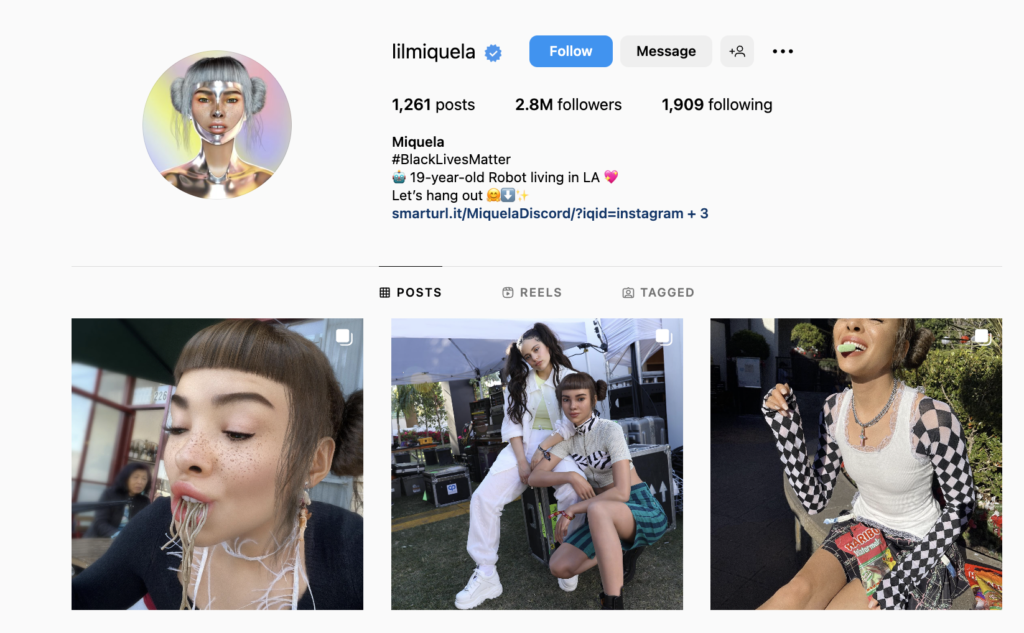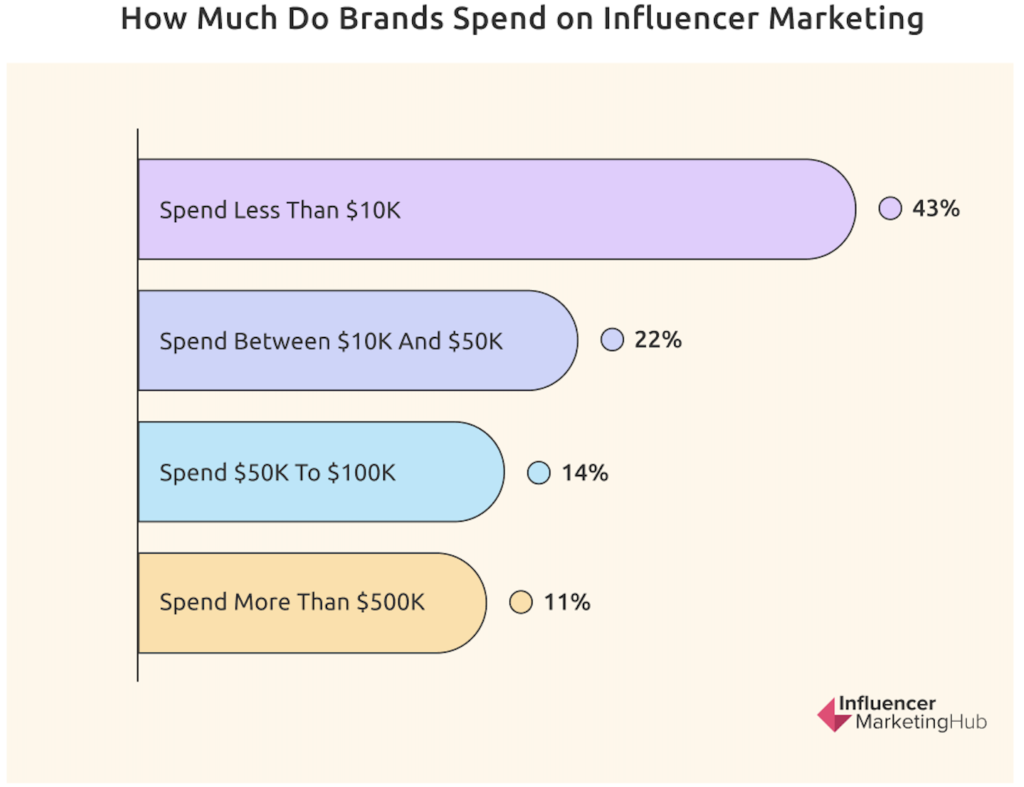Picture a world where the people you admire and follow on social media are not even real. It sounds like something straight out of a dystopian novel, doesn’t it? But as the sun sets on the era of human influencers, the dawn of virtual influencers rises, bringing with it new opportunities and challenges. Are these pixel-perfect personas really an improvement on their human counterparts, or are they a Pandora’s box that we are unwittingly opening?
Let’s embark on a journey into this uncharted territory and explore whether we should be concerned about their impact, or if they might just be the next evolution in marketing.
The Rise of Lil Miquela
Located in Los Angeles, the American city with the highest concentration of Instagram influencers, a cutting-edge company called Brud is responsible for the creation of Lil Miquela. This virtual influencer has captured the attention of over 2.8 million Instagram followers and has been involved in numerous high-profile brand collaborations. She’s one of the compelling social media personas that Brud specializes in creating with AI.

She’s a fascinating blend of reality and fantasy — a digital creation with a seemingly genuine personality and relatable life experiences. On the surface, she appears to be the perfect ambassador for a brand — her smattering of freckles, trendy micro bangs, and cutesy captions have netted her a whopping 2.8 million followers on Instagram. But dig a little deeper, and questions begin to emerge: Is the rise of virtual influencers like Lil Miquela a sign of progress, or a cause for concern?
Advantages and Drawbacks of Virtual Influencers
One could argue that virtual influencers have distinct advantages over their human counterparts. They can be meticulously designed to embody specific brand values, and they never tire or falter. They are immune to scandals and controversies, which means they can represent brands with a level of consistency that is difficult for human influencers to achieve.
In addition, virtual influencers offer the possibility of global appeal by transcending cultural and linguistic barriers. They can be easily adapted to cater to diverse audiences, making them a powerful marketing tool for multinational brands seeking to establish a strong presence across multiple markets.
For example, in March 2023, Levi Strauss & Co. partnered with Amsterdam-based startup LaLaLand.ai to test the use of AI-generated models on its e-commerce sites. The collaboration will enable the parent company to supplement human models with AI-generated ones to increase the number and diversity of models for its products.
Another example is Shudu Gram, a virtual supermodel created by British photographer Cameron-James Wilson, has attracted attention from fashion brands worldwide. Shudu has appeared in advertising campaigns for international brands like Balmain, further illustrating the ability of virtual influencers to transcend cultural and linguistic barriers.
Moreover, the use of virtual influencers allows for cost-effective and efficient marketing campaigns. Unlike human influencers, they don’t require travel, accommodations, or fees for their services, and they can be quickly modified or updated to align with evolving marketing strategies.
Here’s a breakdown of how much companies pay human influencers each year, according to Influencer Marketing Hub’s 2023 Benchmark Report.

In contrast, virtual influencers can significantly reduce or even eliminate these costs, as they do not require payment for their services and do not incur travel or accommodation expenses.
However, the question remains: is this carefully constructed perfection what we truly crave, or are we inadvertently sacrificing authenticity in the process? While virtual influencers may offer a level of control and predictability that is enticing to marketers, there is a risk of losing the human touch that makes influencer marketing so relatable and engaging in the first place.
A 2020 study published in the Journal of Interactive Marketing found that consumers perceived virtual influencers as less trustworthy and authentic compared to human influencers. This suggests that while virtual influencers may be advantageous in terms of cost and control, they may struggle to replicate the authenticity that human influencers can provide.
The appeal of human influencers lies in their ability to share personal experiences, opinions, and emotions, which helps to foster a sense of trust and connection between them and their followers. Virtual influencers, on the other hand, may struggle to replicate this authenticity, as they are inherently artificial creations.
While virtual influencers offer several advantages over their human counterparts, it is crucial to carefully weigh these benefits against the potential drawbacks, including the loss of authenticity and the potential negative effects on the well-being of social media users. Ultimately, striking a balance between leveraging the power of virtual influencers and preserving the human connection is key to navigating this rapidly evolving landscape.
The Blurred Line Between Reality and Fiction
The answer, as is often the case, is not so black and white. Let’s take a step back and consider the broader implications of this virtual phenomenon. If we peer through the looking glass of history, we can see that the concept of fictional characters endorsing products is not entirely new. Think of Tony the Tiger or the Energizer Bunny — these characters have long been used to market products to great success.
So, why should we be concerned about the rise of virtual influencers? The primary difference lies in the blurred line between reality and fiction. While the likes of Tony the Tiger were unmistakably fictional and more mascot than influencer, virtual influencers like Lil Miquela are designed to be uncannily lifelike, potentially leading to confusion and a distortion of our understanding of what is real and what is not.
In addition to concerns surrounding self-esteem and authenticity, we must also consider the potential for virtual influencers to be used in unethical advertising campaigns. While human models can refuse to participate in promoting harmful products or questionable campaigns, virtual influencers have no such autonomy. This raises the issue of using underage-looking virtual influencers in provocative contexts, which may be morally and ethically problematic. As the use of virtual influencers becomes more prevalent, the advertising industry will need to develop and implement comprehensive regulations to address these ethical concerns and ensure the responsible use of this emerging technology.
Navigating the Ethical Implications
As we sail into these uncharted waters, it is crucial to consider the ethical implications of virtual influencers. Could the rise of virtual influencers inadvertently pave the way for unscrupulous advertising practices that exploit their lack of autonomy and potentially blur ethical boundaries? How do we ensure that these virtual influencers do not perpetuate harmful stereotypes or unrealistic expectations?
The rise of virtual influencers is a double-edged sword, offering both new opportunities and unique challenges. As with any powerful tool, it is up to us to wield it responsibly. By critically examining the impact of virtual influencers and their potential consequences, we can navigate this brave new world and ensure that we create a future where both virtual and human influencers can coexist harmoniously. After all, isn’t variety the spice of life?
All opinions expressed in this piece are the writer’s own and do not represent the views of KrASIA. Questions, concerns, or fun facts can be sent to [email protected].

